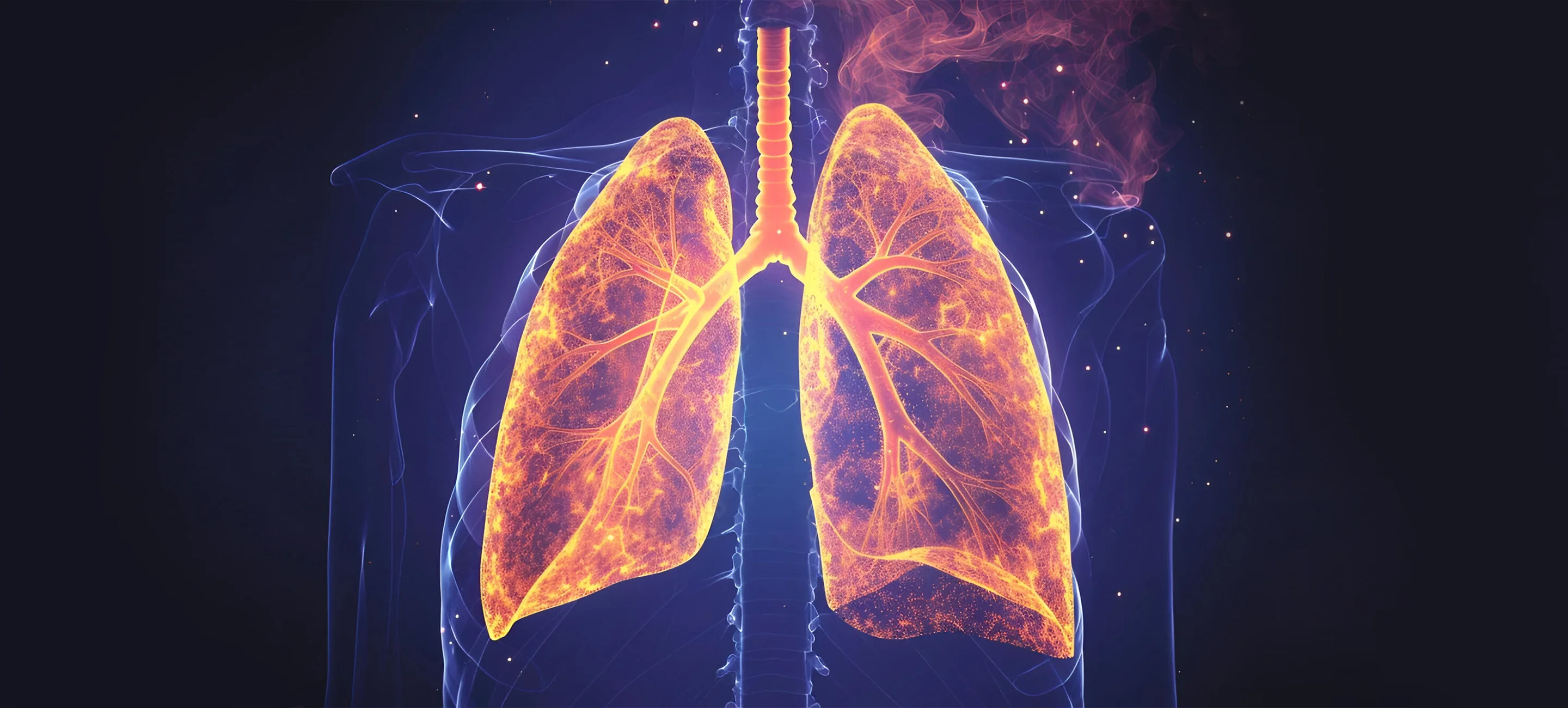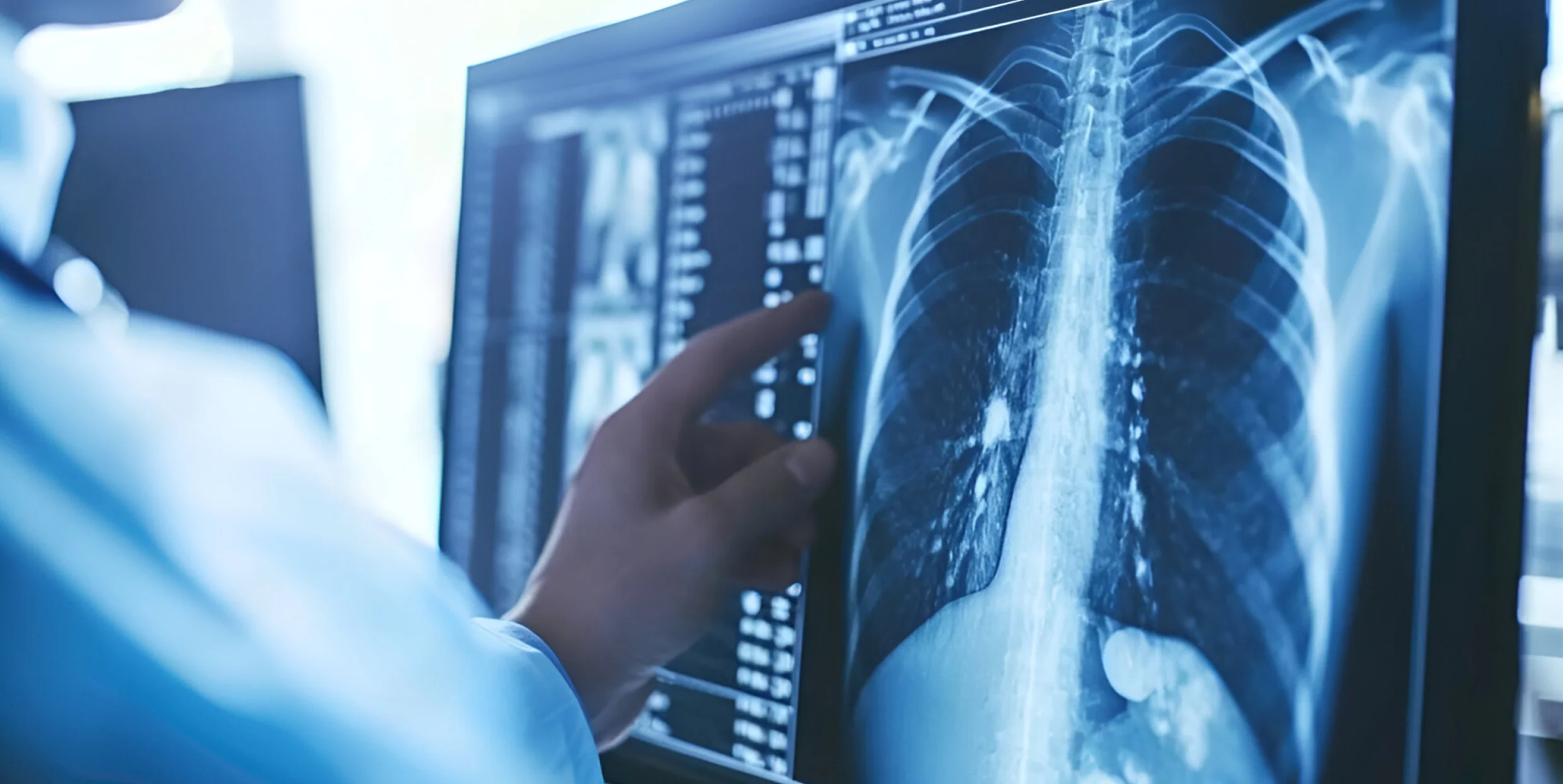
Welcome to Bhagwan Mahaveer Cancer Hospital & Research Centre (BMCHRC), a beacon of hope and healing for individuals confronting Thoracic Cancer. Our institution stands as a pillar of comprehensive care, where cutting-edge treatments merge with compassionate support to guide patients towards optimal health outcomes.
Welcome to Bhagwan Mahaveer Cancer Hospital & Research Centre (BMCHRC), where we offer advanced and compassionate care for patients diagnosed with thoracic cancers. Our dedicated team of thoracic oncologists, supported by cutting-edge facilities, is committed to providing personalized treatment and support to patients and their families throughout their cancer journey.

Thoracic cancers encompass a group of malignancies affecting the organs within the thoracic cavity, including the lungs, esophagus, and mediastinum. These cancers present unique challenges due to their complexity and often aggressive nature. Timely diagnosis and comprehensive treatment are crucial for improving outcomes and quality of life for patients with thoracic malignancies.

At BMCHRC, we adopt a multidisciplinary approach to thoracic cancer care, bringing together a team of experts from various specialties, including thoracic surgeons, medical oncologists, radiation oncologists, pulmonologists, radiologists, and supportive care professionals. This collaborative model ensures that patients receive comprehensive evaluation, individualized treatment plans, and integrated supportive care throughout their cancer journey.

Driven by a commitment to innovation, BMCHRC offers a wide range of advanced treatment modalities for thoracic cancers. From minimally invasive surgical techniques and precision radiation therapies to targeted molecular therapies and immunotherapy, we strive to deliver tailored treatment options that maximize efficacy while minimizing side effects, ensuring the best possible outcomes for our patients.

We understand that a diagnosis of thoracic cancer can be overwhelming for patients and their families. That's why we prioritize compassionate, patient-centered care that addresses not only the physical aspects of cancer but also the emotional and psychosocial needs of our patients. Our dedicated team provides guidance, support, and encouragement, empowering patients to navigate their cancer journey with strength and resilience.

Proper nutrition plays a crucial role in supporting overall health and well-being during thoracic cancer treatment. Our registered dietitians work closely with patients to develop personalized nutrition plans tailored to their specific dietary needs and treatment goals. Whether it's managing side effects, maintaining adequate nutrition, or addressing weight changes, we provide comprehensive nutritional guidance to support patients throughout their cancer journey.

In addition to conventional treatments, we offer access to integrative therapies aimed at enhancing overall well-being and quality of life for patients with thoracic cancers. From acupuncture and massage therapy to mindfulness practices and relaxation techniques, these complementary therapies can help alleviate symptoms, reduce stress, and promote physical and emotional healing.
.webp)
At BMCHRC, we believe in empowering patients through education and active participation in their treatment decisions. Our comprehensive patient education programs provide valuable information and resources to help patients understand their diagnosis, treatment options, and self-care strategies. By empowering patients with knowledge, we aim to promote informed decision-making and enhance their overall cancer experience.
As part of our commitment to advancing cancer care, BMCHRC actively participates in pioneering research initiatives and clinical trials focused on thoracic cancers. Through our research efforts, we strive to identify novel treatment approaches, improve treatment outcomes, and ultimately find a cure for thoracic malignancies.
Meet our esteemed team of medical professionals, each equipped with years of specialized expertise and unwavering dedication to patient care.
Request a callback from our healthcare specialist
Common symptoms may include persistent cough, chest pain, difficulty breathing, unexplained weight loss, hoarseness, coughing up blood, and recurrent respiratory infections. However, these symptoms can also be caused by other conditions, so it's important to consult a healthcare professional for proper evaluation and diagnosis.
Diagnosis often involves a combination of imaging tests such as chest X-rays, CT scans, PET scans, and biopsies to confirm the presence of cancer cells and determine the type and stage of thoracic cancer.
Treatment options may include surgery, chemotherapy, radiation therapy, targeted therapy, immunotherapy, or a combination of these modalities. The choice of treatment depends on factors such as the type, stage, and location of the cancer, as well as the patient's overall health and preferences.
Surgery is often a primary treatment option for thoracic cancers, especially for localized tumors that can be removed surgically. The type of surgery recommended will depend on the specific type and stage of cancer, as well as individual patient factors.
Side effects can vary depending on the type of treatment received but may include fatigue, nausea, vomiting, hair loss, changes in appetite, and radiation-induced skin changes. Your healthcare team will work closely with you to manage side effects through medications, supportive care measures, and lifestyle adjustments.
The duration of treatment varies depending on factors such as the type and stage of cancer, the treatment modalities used, and individual response to therapy. Treatment may range from several weeks to several months, and may involve a combination of surgery, chemotherapy, and/or radiation therapy.
Whether or not you can continue working during treatment depends on several factors, including the type of treatment, its side effects, and the demands of your job. Some patients are able to work part-time or remotely, while others may need to take time off to focus on treatment and recovery. Your healthcare team can provide guidance based on your individual circumstances.
Yes, many cancer centers offer support services for caregivers and family members, including counseling, support groups, educational resources, and assistance with practical matters such as transportation and lodging. These services are designed to help caregivers cope with the challenges of supporting a loved one through cancer treatment.
Radiation therapy uses high-energy beams to target and destroy cancer cells. It can be used as a primary treatment for thoracic cancer, especially when surgery is not an option or as adjuvant therapy following surgery to reduce the risk of recurrence. Your oncologist will determine if radiation therapy is appropriate for your specific situation.
Yes, clinical trials are research studies that evaluate new treatments, medications, or procedures for thoracic cancer. Participating in a clinical trial may offer access to cutting-edge treatments not yet available to the general public and contribute to advancing the field of thoracic oncology. Your healthcare team can discuss whether you may be eligible to participate in any ongoing clinical trials.
Immunotherapy is a type of cancer treatment that harnesses the body's immune system to recognize and attack cancer cells. It can be used alone or in combination with other treatments for thoracic cancer. Immunotherapy drugs, such as checkpoint inhibitors, target specific proteins on cancer cells, helping to enhance the immune response against the tumor.
While there are no guaranteed ways to prevent thoracic cancer, certain lifestyle modifications can help reduce the risk. These include avoiding tobacco use, maintaining a healthy weight, eating a balanced diet rich in fruits and vegetables, limiting alcohol consumption, and minimizing exposure to environmental toxins such as asbestos and radon.
Thoracic cancer patients have access to a range of supportive care services aimed at addressing their physical, emotional, and practical needs. These services may include pain management, palliative care, nutritional counseling, physical therapy, psychological support, and assistance with financial and logistical concerns. Your healthcare team will work with you to ensure that you receive comprehensive support throughout your cancer journey.